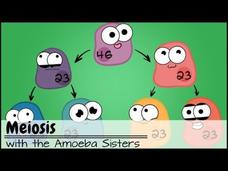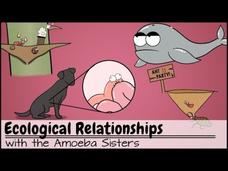Socratica
Chemistry: Stoichiometry Part 2—Mass to Mass Conversions
The term stoichiometry derives from the Greek words stoicheion meaning element and metron meaning measure. The second Socratica video in a two-part series within a larger chemistry playlist introduces more complex stoichiometry problems....
Socratica
Kepler's Second Law of Motion
Orbital velocity of planets change. Kepler's Second Law of Motion attempts to explain and predict the change in velocity. Scholars learn how to apply this law as they watch the video lesson.
American Chemical Society
How Do We Know the Age of the Earth?
Some 4.565 billion candles would be needed for a birthday cake for Earth. Young scientists view a video to learn about historical attempts to determine the age of Earth. They see how advances in radioactive dating led to the currently...
American Chemical Society
Have We Found All The Elements?
You've always wanted to know why ytterbium is called ytterbium, haven't you? An engaging video investigates the discovery of elements throughout history. It posits the theory that we are close to having discovered all the elements.
Socratica
Chemistry: Molar Mass
Molar mass, gram molecular mass, and gram formula mass essentially mean the same thing. The brief video, part of the Socratica "Chemistry Lessons" playlist, explains how to solve these problems. It walks through the required tools, the...
Socratica
Chemistry: What Is an Ionic Bond?
Teach your class all they want to know about ionic bonds. An engaging video, part of the Socratica "Chemistry Lessons" playlist, explains what ionic bonds are and how they form. It describes multiple examples of ionic bonds and...
Socratica
Chemistry: Percent Composition
How much oxygen is in water? Is it the same as the chemical formula? Learners observe the differences between a substance's formula and its percent composition with a video from Socratica's Chemistry Lessons series. The narrator...
Real Engineering
Designing the Fastest Wheels in History
Record-setting cars need specially made tires. Young engineers watch a video in the Real Engineering series to learn about designing tires. Along the way, they study acceleration, inertia, and angular velocity.
Socratica
Chemistry: Gay-Lussac's Law (Gas Laws)
If an aerosol can lands in a fire, it explodes due to Gay-Lussac's Law. A video from a chemistry playlist explains Gay-Lussac's Law and the relationship between pressure and temperature of gases. It includes two guided practice problems...
Socratica
Chemistry: Balancing Chemical Equations
Teaching chemical equations can be quite a balancing act! Bolster your class' balancing abilities using a video from a helpful chemistry playlist. The resource explains the theory behind balancing, then shows viewers how to accomplish it...
Socratica
Chemistry: Balancing Chemical Equations—Algebraic Method
If you love algebra, then you're gonna love this balancing method! Introduce young chemists to the algebraic method of balancing chemical equations using a video from an informative chemistry playlist. The narrator works five sample...
Physics Girl
Strange Sand Acts Like Liquid
Can you use a solid to study fluid dynamics? You bet! Science scholars examine the process of fluidization with a video from an extensive physics playlist. The narrator demonstrates and explains how the uniform movement of air causes...
Physics Girl
This Phenomenon Only Happens in Hawaii ... and Cuba, Nigeria, Indonesia, Peru, Sudan, Laos and…
What do Hawaii, Nigeria, and Peru have in common? Each of these locations, plus many others, get to see the subsolar point! But, what is it? A video from a comprehensive physics playlist puts the phenomenon at the forefront by explaining...
Amoeba Sisters
Cell Membranes and Cell Transport
Cells are busy places! How do things move around in such a tiny environment? Introduce young life scientists to the types of cellular transport through a video that is part of a large biology playlist. Animated characters demonstrate how...
Amoeba Sisters
Properties of Water
Being essential for life is only one of water's many amazing properties! Why is water so versatile? Biology scholars discover the myriad of uses for water and the properties that make them possible. Content includes density, surface...
Amoeba Sisters
Endosymbiotic Theory
Eukaryotes—were we born from an act of predation that backfired? Ponder this and other questions of evolution with a video from a well-written biology playlist. Topics include the origins of mitochondria and chloroplasts, unusual...
Amoeba Sisters
Genetic Drift
Survival is a game of chance, catch my drift? Examine the factors that influence genetic drift with an entertaining video from a large biology playlist. The resource covers the myriad conditions that come into play when a species...
Amoeba Sisters
Meiosis
Why do siblings often look so different from one another? Discover the process of making gametes using a short video from a large biology playlist. The narrator explains each step while animated chromatids play out the scenario that...
Amoeba Sisters
Ecological Relationships
What are ecological relationships? Well, it can be complicated! Paint a clear picture for pupils with a fun and informative video. It explains and illustrates each relationship thoroughly, from pesky parasites to snuggly symbiotes.
PBS
When the Book is Better than the Movie
Sometimes the book is better than the movie; other times, the movie comes out on top. A video discusses the topic of novels and their film adaptations, pointing out specific texts and how the tale translated to the big screen. The...
Veritasium
Is Our Food Becoming Less Nutritious?
Is today's food less nutritious? Veritasium explores the research and the reasons some scientists now consider food nutrient-deficient. The video also considers possible causes and whether the human population should be concerned.
Nature League
Nature + Engineering
Viewers observe many nature-inspired examples in technology, household items, and health care with the final video in a five-part series on Evolution and Speciation. The video focuses on human engineers inspired by earth's wonders.
Nature League
Nature + Philosophy
Scientists often define their underlying assumptions, but not always from a philosophical approach. Viewers learn about the philosophy of science from three experts in various fields. They discuss how the perception of science changes as...
Federal Reserve Bank
Episode 8, Segment 2: The PPF Illustrates Underemployment, Economic Expansion, and Economic Growth
Is it possible to be overqualified for the current job market? Scholars analyze underemployment and what it takes to potentially out-price yourself for a job. A short video lesson outlines economic growth and researches job trends....
Other popular searches
- Editing Paragraphs
- Revising and Editing
- Peer Editing
- Paragraph Editing Practice
- Proofreading and Editing
- Photo Editing
- Editing Checklist
- Editing Marks
- Paragraph Editing
- Peer Editing Checklist
- Peer Review
- Self Editing

























